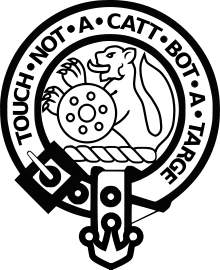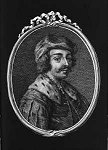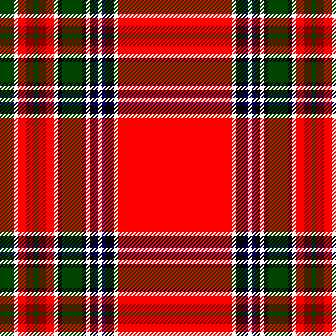|
The cat is a wildcat. Famous MacBeans The MacBean clan has many heroes and heroines to be proud of. Here are just a few: King Donald Bane III of Scotland (Donald the Fair) (1033-1097) our 30th. Great Grandfather
Domnall mac Donnchada or Domnall Bán (Donald III) was the second known son of Donnchad mac Crínáin. . Domnall's activities during the reign of his elder brother Máel Coluim are not recorded. It appears that he was not his brother's chosen heir, contrary to earlier custom, but that Máel Coluim had designated Edward, his eldest son by Margaret, as the king to come. If this was Máel Coluim's intent, his death and that of Edward on campaign in Northumbria in November 1093 confounded his plans. These deaths were followed very soon afterwards by that of Queen Margaret. John of Fordun reports that Domnall invaded the kingdom after Margaret's death "at the head of a numerous band", and laid siege to Edinburgh with Máel Coluim and Margaret's sons inside. Fordun has Edgar Ætheling, concerned for his nephews' well-being, take the sons of Máel Coluim and Margaret to England. In May 1094, Domnall's nephew Donnchad, son of Máel Coluim and his first wife Ingibiorg Finnsdottir, invaded at the head of an army of Anglo-Normans and Northumbrians, aided by his half-brother Edmund and his father-in-law Gospatric. This invasion succeeded in placing Donnchad on the throne, but an uprising defeated his allies and he was compelled to send away his foreign troops. Donnchad was killed on 12 November 1094 by Máel Petair, Mormaer of Mearns. The Annals of Ulster say that Donnchad was killed on the orders of Domnall (incorrectly called his brother) and Edmund. Domnall resumed power, probably with Edmund as his designated heir. Domnall was an elderly man by the standards of the day, approaching sixty years old, and without any known sons, so that an heir was clearly required. William of Malmesbury says that Edmund bargained "for half the kingdom", suggesting that Domnall granted his nephew an appanage to rule. Edgar, eldest of Máel Coluim and Margaret's exiled sons, obtained the support of William Rufus, although other matters delayed Edgar's return on the coat-tails of an English army led by his uncle Edgar Ætheling. Domnall's fate is not entirely clear. William of Malmesbury tells us that he was "slain by the craftiness of David ... and by the strength of William [Rufus]". The Anglo-Saxon Chronicle says of Domnall that he was expelled, while the Annals of Tigernach have him blinded by his brother. John of Fordun, following the king-lists, writes that Domnall was "blinded, and doomed to eternal imprisonment" by Edgar. The place of his imprisonment was said to be Rescobie, by Forfar, in Angus. The sources differ as to whether Domnall was first buried at Dunfermline Abbey or Dunkeld Cathedral, but agree that his remains were later moved to Iona. While no sons of Domnall are known, Hextilda, daughter of Domnall's daughter Bethóc, married Richard Comyn, Justiciar of Lothian. The claims of John II Comyn, Lord of Badenoch to the crown in the Great Cause came from Domnall through Bethóc and Hextilda. Ladhmann son of Domnall, "grandson of the King of Scots", who died in 1116 might have been a son of Domnall.
Brewer or innkeeper, Major Gillies MacBean stands out as one of the most valiant figures on the Culloden battlefield. Six feet seven inches in height, and armed with claymore and target, he was a formidable figure. When the Argyll militia broke down a wall on the right, which enabled the dragoons to attack the flank of the Highland army, MacBean set himself at the gap, and cut down man after man as they came through. Thirteen in all, including Lord Robert Ker, had fallen under his strokes, and when the enraged enemy closed round him in numbers, he set his back to the wall and proceeded to sell his life as dearly as possible. An English officer, struck by his heroism, called to the soldiers to "save that brave man," but at that moment the heroic Major fell, his thigh bone broken, a dreadful sword cut on his head, and his body pierced with many bayonet wounds. His widow is said to have composed a pathetic lament to his memory—Mo run geal oig, "My fair young beloved." His fate was also enshrined in a set of verses which appeared in a northern periodical and have been attributed to Lord Byron. Lord Byron, a British Poet wrote: "The clouds may pour
down on Culloden's red plain,
Major-General William MacBean "Major General William Macbean V.C. 93rd Sutherland Highlanders. Born at Inverness January 1819. Died at Woolwich 22nd June 1878. Who served with great distinction at the Crimean War and Indian Mutiny. Presented to the Town in 1897 by the family of his brother the late Dean of Guild James Macbean."
William
Macbean enlisted as a young man in the 93rd Sutherland Highlanders,
the regiment he remained with until he retired. He spent fifteen or
sixteen years in the ranks as a non-commissioned officer. In 1854,
while serving in the Crimea, he was raised to the rank of ensign. At
Varnia he was in charge of the wounded men when he successfully
intervened in a dispute between French and Turkish troops. He was
awarded the 'Order of Medjidie' by the Sultan.
Major Forbes
MacBean
Marnie MacBean Tartans
Ancient Modern |




